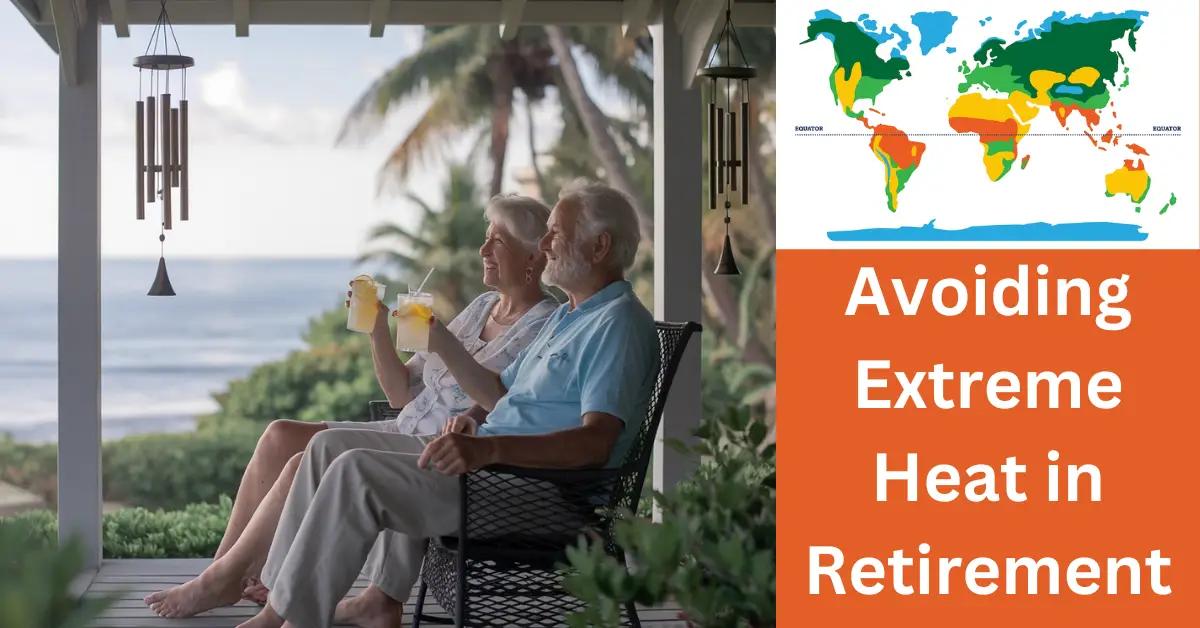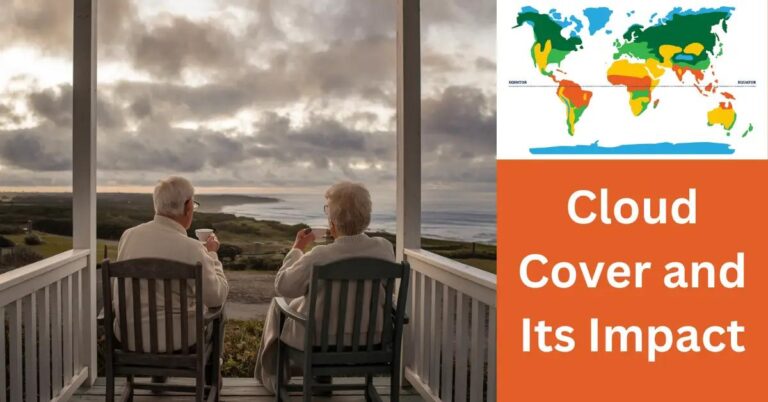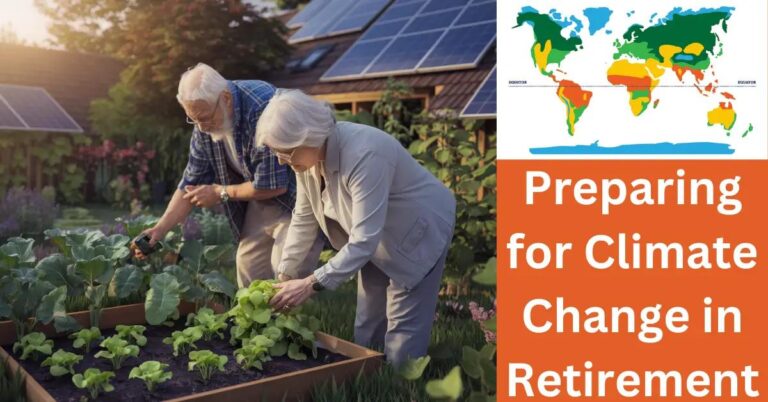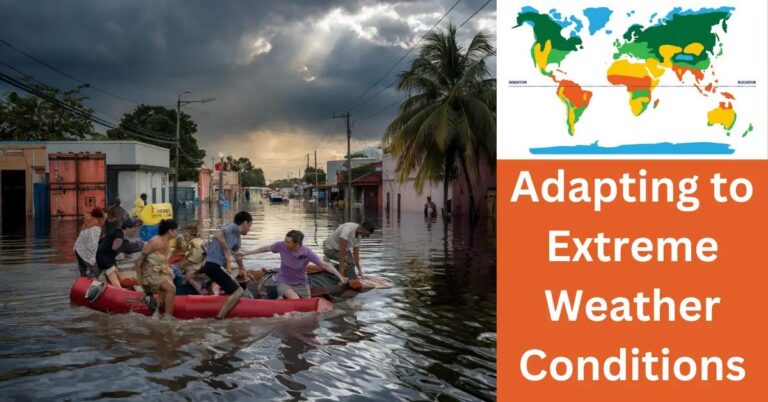TL;DR:
- Seniors should use air conditioning and fans to stay cool.
- Keep homes cool by closing blinds and opening windows for cross-ventilation during cooler times.
- Choose easy-to-use cooling devices like portable fans or cooling mats.
- Develop a heat management plan including daily weather checks, hydration, and appropriate clothing.
- Seniors experience heat intolerance due to changes in sweat glands and blood vessels.
- Symptoms of heat exhaustion include dizziness, weakness, and headaches; confusion may indicate heat stroke.
- Prepare for heat waves with battery-powered fans, extra water, lightweight clothing, and know community cooling centers.
- Portland, Oregon, and Asheville, North Carolina, offer cooler climates suitable for retirement.
- Consider personal climate preferences, urban vs. rural living, and local activities for an active retirement.
As our bodies age, handling extreme heat becomes more challenging. Staying cool is crucial to avoid heat-related health risks. So, how can retirees embrace sunny days without wilting? Let's explore practical air conditioning tips, senior-friendly cooling devices, and smart home adjustments. Find out how to create a heat management plan that keeps you comfortable. Whether you're preparing for heat waves or scouting cooler retirement spots, let's beat the heat together!
How Can Seniors Beat the Heat?
Staying cool in hot weather is key for older adults. Too much heat can cause problems for our bodies. So, how do seniors stay cool? First, answer: Use air conditioning and fans. Air conditioning is the best way to cool a room. Make sure units work well and filters are clean. If air conditioning is too costly, fans help too. Place them to move air around the room.
Let's also talk about home adjustments. Keeping your home cool involves more than machines. Make simple changes like closing blinds during the day. This keeps sunlight, which warms rooms, out. You can also improve airflow by opening windows for cross-ventilation at cooler times, like early morning or evening.
What cooling devices are best for seniors? Select ones that are easy to use and safe. A popular choice is a portable fan or a cooling mat. These can be moved to where they are needed most. Look for devices with clear controls that don’t require bending or reaching.
Creating a heat management plan for summer helps, too. Plan ahead by writing down ways to stay cool. Check the weather each day and adjust your activities. Make plans for indoor events when it’s too hot outside. Hydration is part of the plan. Drink plenty of water, even if you’re not thirsty. Wear loose, light clothing in light colors.
Answering "What can you do to keep yourself from extreme heat?" gives you tools to stay safe. Remember, planning and being aware of heat's impacts help keep you cool and healthy. For more, learn about cooling tips for seniors.
Why Do Seniors Experience Heat Intolerance?
Heat becomes tougher to handle as we age. Why can't I tolerate heat as I get older? Aging causes changes in how our bodies react to heat. Our sweat glands may not work as well, reducing our ability to cool down. Blood vessels also get less flexible, making it tougher for blood to move heat away from the body. These changes can make seniors more sensitive to heat.
Heat impacts our health in serious ways. Elderly heat exposure dangers include heat exhaustion or even heat stroke. What could happen if heat gets too extreme? Symptoms can be like feeling dizzy, weak, or getting a headache. In some cases, heat can cause confusion or make existing health issues worse.
Knowing the signs of heat intolerance is key. How can I know if my body is not handling the heat? Look out for excessive sweating and a fast heartbeat. It’s also crucial to be aware if you feel faint or tired without a clear reason. Recognizing these signs early helps in preventing serious health problems.
Why do some older people handle heat differently from others? Each person's heat tolerance varies due to lifestyle, health, and even medication. Some medications can increase the risk of heat intolerance by affecting body temperature regulation. That's why discussing any symptoms with a health professional is vital.
For more in-depth details on how physiological changes affect heat tolerance in seniors, you can read through relevant research findings here. Understanding these changes not only helps in staying safe but also in planning activities during warm weather. This can help us avoid health risks and improve comfort when it gets hot outside.
What Preparations Can Help Seniors Handle Heat Waves?
When it's too hot, seniors can feel stressed. But what is too hot? Temperatures of 90°F or more can be dangerous. It's vital to recognize signs early for safety. Always check for heat wave warnings and advisories on your local weather channel. These alerts help you prepare for spikes in temperature.
Building a heat wave preparedness kit is a smart step. You should have battery-powered fans, extra water, and lightweight clothing. These items can keep you cool when the heat rises.
Community cooling centers are vital in heat emergencies. They offer a safe, air-conditioned space for seniors. Towns often set these up in libraries or senior centers. Check if your community has such plans. If not, suggest setting one up.
Knowing the early symptoms of heat-related illnesses can save lives. Symptoms like dizziness, nausea, or headaches mean it's time to cool down. For signs of heat stroke like rapid pulse or confusion, seek medical help fast.
Stay hydrated to keep your body cool. Water helps regulate your body’s temperature. Always carry a water bottle. Aim to drink more, especially if you notice symptoms of dehydration.
Use these strategies to guard against heat stress. Elderly folks must remain vigilant during extreme heat. Planning and community resources can play a big role in your well-being. Preparing for high temperatures involves vigilance and community awareness, ensuring a safe environment for everyone.
Where Are the Best Places for Seniors to Retire for a Cooler Climate?
Choosing the right place to retire can be tough. When thinking about cooler climates, you must ask yourself: "What kind of weather is best for my comfort?" [Precision: Clear understanding of personal climate preferences is crucial.] Some people love a warm sun, while others dream of a cool breeze. Knowing what you like will help you pick the best spot for your golden years.
Some cities are ideal because they have mild summers and don't get too hot. Portland, Oregon, has beautiful greenery and comfortable summers. Asheville, North Carolina, offers scenic views and cool mountain air.
Another big choice is between city life and rural peace. Do you want the hustle and bustle of an urban area? Or maybe a quiet, countryside setting? Urban areas often have more healthcare options and social activities. Rural areas can offer peace, natural beauty, and a close-knit community.
Living in a cooler place might mean getting used to new styles. You might need clothes for chilly mornings or rain gear. Adapting to a different climate can be fun but needs planning. Connecting with local retirees is helpful. They can share tips on making the most of the area's weather and forming friendships.
Finally, think about how you can stay involved and active. Joining local clubs, attending events, and building a retiree network can make your retirement truly fulfilling. This sense of community can improve your well-being and help avoid loneliness.
Conclusion
Beating the heat is not just about staying cool; it's about thriving. Seniors can handle the heat by using air conditioning, fans, and proper ventilation. Choosing the right cooling devices and creating a summer plan ensures safety. Age affects how we feel heat, making awareness of personal tolerance crucial. Recognize heat warnings, prepare kits, and stay hydrated. Consider cooler climates for comfort and explore new places to retire. Remember, understanding heat helps us live well and enjoy life. Stay informed, stay safe, and make the most of every season.












